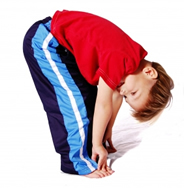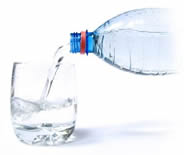
Webmaster note: Parents often ask for simple tips to help their children maintain a healthy lifestyle. Dr. Isaac Eliaz offers 8 great suggestions.
 1) Help them exercise. This recommendation remains at the top of the list for many conditions, but especially childhood obesity. And for good reason. With P.E. programs in schools facing budget cuts, and our increasingly sedentary lifestyles, simple children’s activities such as running and playing outside are fading into history. What was once a normal pastime for children, daily physical play activities, especially out in nature, seem to be a thing of the past, but they may be more important than ever. In addition to fighting obesity and health problems related to sedentary habits, regular exercise and physical activity have been shown to promote better grades, encourage higher self esteem and reduce stress and anxiety in children. Get children involved in a physical activity they enjoy, and teach them of the many benefits to help them stick with it. And as always, teach by example. Go on long walks with your kids and make it a quality-time, bonding experience.
1) Help them exercise. This recommendation remains at the top of the list for many conditions, but especially childhood obesity. And for good reason. With P.E. programs in schools facing budget cuts, and our increasingly sedentary lifestyles, simple children’s activities such as running and playing outside are fading into history. What was once a normal pastime for children, daily physical play activities, especially out in nature, seem to be a thing of the past, but they may be more important than ever. In addition to fighting obesity and health problems related to sedentary habits, regular exercise and physical activity have been shown to promote better grades, encourage higher self esteem and reduce stress and anxiety in children. Get children involved in a physical activity they enjoy, and teach them of the many benefits to help them stick with it. And as always, teach by example. Go on long walks with your kids and make it a quality-time, bonding experience.
2) Ensure they get proper nutrition and that they understand its importance. Thanks to our modern health-conscious movement, there now are a large number of great, healthy food options that are also kid friendly. This means as parents, you don’t have to choose between something that your kids will enjoy and foods that are truly nutritious. Stock your pantry with foods that are minimally processed and don’t  contain added sweeteners, unhealthy fats or processing agents. Emphasize fresh fruits and vegetables, whole grains and lean protein. Avoid foods that contribute to metabolic disorders and obesity, including diet sodas or foods with artificial sweeteners; trans-fats such as hydrogenated oils or fried foods; and foods loaded with sugar or corn syrup. A number of innovative software designers have developed free, easy to use and fun online tools for kids to learn about nutrition and get involved in their own meal planning.www.zisboombah.com is a great, award-winning example of a colorful, interactive tool to help kids make healthy food choices.
contain added sweeteners, unhealthy fats or processing agents. Emphasize fresh fruits and vegetables, whole grains and lean protein. Avoid foods that contribute to metabolic disorders and obesity, including diet sodas or foods with artificial sweeteners; trans-fats such as hydrogenated oils or fried foods; and foods loaded with sugar or corn syrup. A number of innovative software designers have developed free, easy to use and fun online tools for kids to learn about nutrition and get involved in their own meal planning.www.zisboombah.com is a great, award-winning example of a colorful, interactive tool to help kids make healthy food choices.
3) Enforce regular bedtime. A number of published studies in recent years have linked obesity and associated metabolic problems with lack of sleep, and disrupted natural sleep rhythms (sleeping during the day and working at night, as with shift workers). Children and adolescents need even more sleep than adults, though their energy levels may be higher during the day. Regular bedtime helps to regulate critical biological processes that contribute to healthy weight and metabolism, along with other important biological functions. Getting to bed before 10:00 PM is said to offer more restorative sleep than a bedtime after midnight. Children should maintain 9-10 hours of sleep nightly. Turn off electronics at least one hour before bedtime, and restrict TV access in their bedrooms, to help them unwind naturally.
 4) Help them reduce stress. It’s almost as if, with all our technology, information overload and increased social anxiety, children are not allowed to be children anymore. Schools give more homework now than before, and allow for less play time and physical activity during the school day. When physical activity is emphasized, it’s usually in the form of extremely stressful competitive sports. Social medial presents another set of stress factors: Social media has been shown to increase cyber-bullying, promote low self esteem in some circumstances and in many ways, replace meaningful social connection. All of these factors contribute to a rise in stress and depression among our children today, which in turn can increase childhood obesity and other unhealthy conditions. Stress increases cortisol which over time, causes the body to store fat. Lack of sleep, caused by anxiety and stress, contributes to obesity. Depression can fuel binge eating and sugary food cravings. The list goes on. As a parent or guidance figure, you can combat this by giving children unconditional love and support; discussing their feelings and experiences with them in depth; role playing certain stressful situations to help them prepare; and teaching healthy stress relief measures such as deep breathing and mindful meditation which have shown great benefits for both children and adults. Physical activity and healthy diet can also help reduce feelings of anxiety and depression.
4) Help them reduce stress. It’s almost as if, with all our technology, information overload and increased social anxiety, children are not allowed to be children anymore. Schools give more homework now than before, and allow for less play time and physical activity during the school day. When physical activity is emphasized, it’s usually in the form of extremely stressful competitive sports. Social medial presents another set of stress factors: Social media has been shown to increase cyber-bullying, promote low self esteem in some circumstances and in many ways, replace meaningful social connection. All of these factors contribute to a rise in stress and depression among our children today, which in turn can increase childhood obesity and other unhealthy conditions. Stress increases cortisol which over time, causes the body to store fat. Lack of sleep, caused by anxiety and stress, contributes to obesity. Depression can fuel binge eating and sugary food cravings. The list goes on. As a parent or guidance figure, you can combat this by giving children unconditional love and support; discussing their feelings and experiences with them in depth; role playing certain stressful situations to help them prepare; and teaching healthy stress relief measures such as deep breathing and mindful meditation which have shown great benefits for both children and adults. Physical activity and healthy diet can also help reduce feelings of anxiety and depression.
5) Give them probiotics. Probiotics, or “friendly digestive flora” such as lacobaccillus and bifidobacterium species are health-promoting digestive bacteria that are also present in cultured foods such as yogurt, keifer, saurkraut and others. They provide numerous essential health benefits and are important for both children and adults. In addition to immune health, digestive health, cogntive health and other ares, healthy digestive flora are shown to help to regulate healthy weight and prevent obesity in children and adults. If your kids don’t like saurkraut or yogurt, try one of the many brands of probiotic supplements for children.
6) Avoid long term prescription medication. More and more children today are being given heavy doses of pharmaceuticals intended to treat behavioral disorders such as ADD, ADHD and depression, among others. These drugs are often not screened for long term side effects, neither in children nor adults. Though many of these drugs, such as Ritalin or Adderall, are forms of amphetamines and are often also prescribed for weight loss, their long term use disrupts normal metabolic processes. As a result, when the drugs are stopped or dosages reduced, rapid weight gain can ensue, even in children. Added to the disruption in normal sleep rhythms caused by these drugs, many of these pharmaceuticals may actually result in weight gain and contribute to obesity.
7) Help them avoid environmental toxins. Exposure to harmful toxins and heavy metals has become a normal part of modern life. From air pollution in cities, to toxins in our food, medicines and everyday household products, we are exposed to more and more harmful pollutants that have detrimental effects on health, particularly for children. Toxins such as BPA (bisphenol A) are common in food and home products and are found to influence fat cell production. Hormones in meat, heavy metals in exhaust and many others interfere with normal metabolic functions and can contribute to obesity. While it’s impossible to avoid exposure completely, you can make conscious decisions to purchase pesticide-free organic foods and products which do not contain harmful chemicals. Additionally, studies show that the natural ingredient modified citrus pectin is safe and effective for helping to remove heavy metals such as lead, mercury and others in children and adults.
 8) Promote proper hydration. Children dehydrate very easily because they have less fluid reseviours and they often need to be reminded to drink water. Proper hydration ensures proper metabolic function and supports numerous critical processes in the body. Dehydration can lead to weight gain, stress, allergies, reduced immune function, digestive problems, and a host of other conditions. By ensuring children drink half their body weight in ounces of pure filtered water, you help them flush fat and fat-generating toxins and maintain overall health and wellness.
8) Promote proper hydration. Children dehydrate very easily because they have less fluid reseviours and they often need to be reminded to drink water. Proper hydration ensures proper metabolic function and supports numerous critical processes in the body. Dehydration can lead to weight gain, stress, allergies, reduced immune function, digestive problems, and a host of other conditions. By ensuring children drink half their body weight in ounces of pure filtered water, you help them flush fat and fat-generating toxins and maintain overall health and wellness.
– Isaac Eliaz, MD, MS, LAc is an integrative medical doctor, licensed acupuncturist, researcher, product formulator, and frequent guest lecturer. He has been a pioneer in holistic medicine since the early 1980s, and has published numerous peer-reviewed research papers on several of his key integrative health formulas. He is the founder and medical director of Amitabha Medical Clinic in California, an integrative health center specializing in cancer and chronic conditions.
